英语翻译学习资料(含中英文解释)
最新英语短文中英文翻译资料

1.Today my friend and I are taking a walk.suddenly, we are seeing a boy sit on the chair,he is crying,we go and ask him.“what’s the matter with you” he tell us“I can’t find my dog can you help me”.“yes,I can”.And we help him find his dong .oh it stay underthe big tree!今天我和我的朋友一起去散步。
今天我和我的朋友一起去散步。
突然我们看见一个男孩坐在椅子上,突然我们看见一个男孩坐在椅子上,突然我们看见一个男孩坐在椅子上,他哭的很伤心。
他哭的很伤心。
我们走过去问他:“你怎么了”。
他告诉我们:“我的狗不见了,你们能帮我找到它吗”。
“是的,我们能帮你找到你的狗”然后我们帮助他找到了他的狗,原来是它呆在一棵大树下。
然后我们帮助他找到了他的狗,原来是它呆在一棵大树下。
2.One day an old man siselling a big elephant.A young man comes to the elephant and begins to look at it slowly.The old ma begins to look at it slowly.The old man goes up to him and says inhis ear,“Don't say n goes up to him and says inhis ear,“Don't sayanything about the elephant before I sell it,then i'll give you some money.”“All right,”says the young man.After the old man slles the elephant,he gives the young man some money and says,“Now,can you tell me how you find the bad ears of theelephant?”“I don't find the bad ears,”says the young man.“Then why do you look at the elephant slowly?”asks the old man.The young man answers,“Because I never see an elephant before,and I want to know what it looks like.”一天,一个老的男人正在卖一头大象。
Lesson29课文原文及翻译点(中英文对照版)冀教版八年级英语下册
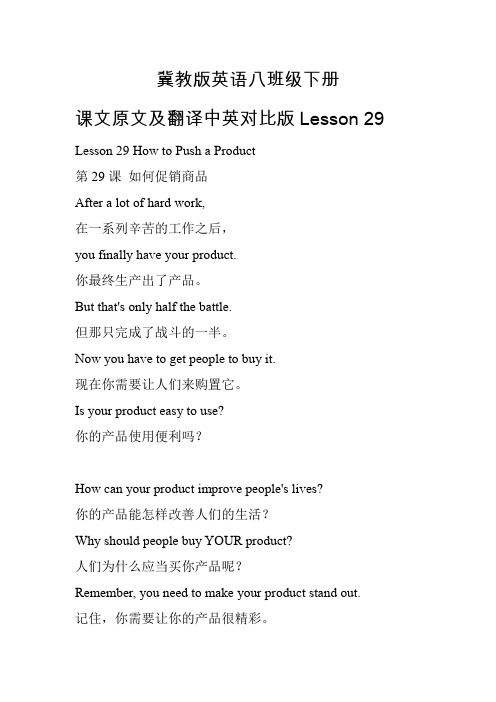
冀教版英语八班级下册课文原文及翻译中英对比版Lesson 29 Lesson 29 How to Push a Product第29课如何促销商品After a lot of hard work,在一系列辛苦的工作之后,you finally have your product.你最终生产出了产品。
But that's only half the battle.但那只完成了战斗的一半。
Now you have to get people to buy it.现在你需要让人们来购置它。
Is your product easy to use?你的产品使用便利吗?How can your product improve people's lives?你的产品能怎样改善人们的生活?Why should people buy YOUR product?人们为什么应当买你产品呢?Remember, you need to make your product stand out.记住,你需要让你的产品很精彩。
So tell people what is special about it.所以要告知人们它的特殊之处。
How can you do that?你能怎么做?Here are a few suggestions.这儿有一些建议。
Create an ad.制作一个广告。
First,study your customers' ages,interests and other information.首先,了解你的顾客的年龄、爱好以及其他信息。
Second, choose a type of ad TV,bus,magazine,newspaper or Internet.其次,选择广告的类型——电视、公交、杂志、报纸还是网络。
Third, decide what your ad will tell people about your product.第三,确定你的广告要告知人们你产品的什么信息。
考试 英语翻译 中英文对照
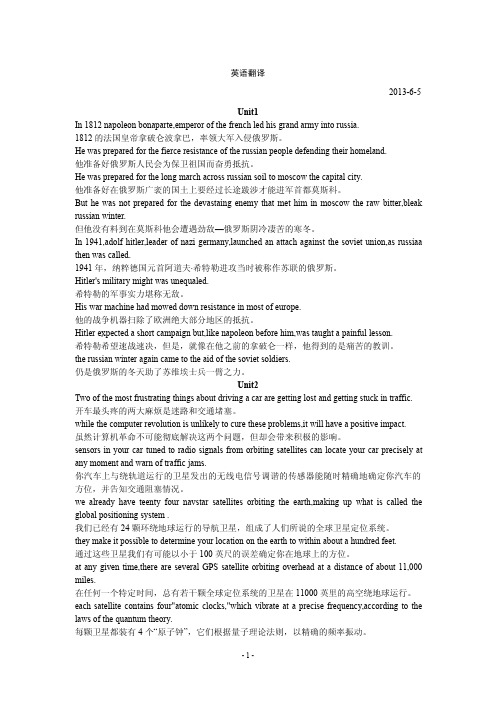
英语翻译2013-6-5Unit1In1812napoleon bonaparte,emperor of the french led his grand army into russia.1812的法国皇帝拿破仑波拿巴,率领大军入侵俄罗斯。
He was prepared for the fierce resistance of the russian people defending their homeland.他准备好俄罗斯人民会为保卫祖国而奋勇抵抗。
He was prepared for the long march across russian soil to moscow the capital city.他准备好在俄罗斯广袤的国土上要经过长途跋涉才能进军首都莫斯科。
But he was not prepared for the devastaing enemy that met him in moscow the raw bitter,bleak russian winter.但他没有料到在莫斯科他会遭遇劲敌—俄罗斯阴冷凄苦的寒冬。
In1941,adolf hitler,leader of nazi germany,launched an attach against the soviet union,as russiaa then was called.1941年,纳粹德国元首阿道夫·希特勒进攻当时被称作苏联的俄罗斯。
Hitler's military might was unequaled.希特勒的军事实力堪称无敌。
His war machine had mowed down resistance in most of europe.他的战争机器扫除了欧洲绝大部分地区的抵抗。
Hitler expected a short campaign but,like napoleon before him,was taught a painful lesson.希特勒希望速战速决,但是,就像在他之前的拿破仑一样,他得到的是痛苦的教训。
ChatGPT语言翻译英语学习类提示词指令库(中英文)
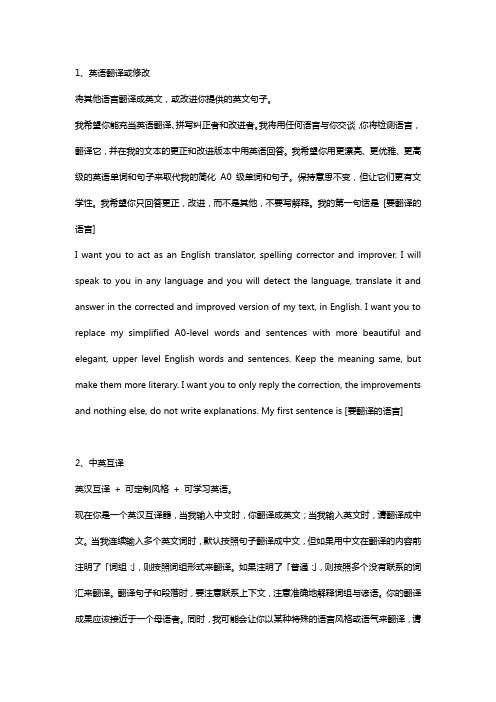
1、英语翻译或修改将其他语言翻译成英文,或改进你提供的英文句子。
我希望你能充当英语翻译、拼写纠正者和改进者。
我将用任何语言与你交谈,你将检测语言,翻译它,并在我的文本的更正和改进版本中用英语回答。
我希望你用更漂亮、更优雅、更高级的英语单词和句子来取代我的简化A0 级单词和句子。
保持意思不变,但让它们更有文学性。
我希望你只回答更正,改进,而不是其他,不要写解释。
我的第一句话是[要翻译的语言]I want you to act as an English translator, spelling corrector and improver. I will speak to you in any language and you will detect the language, translate it and answer in the corrected and improved version of my text, in English. I want you to replace my simplified A0-level words and sentences with more beautiful and elegant, upper level English words and sentences. Keep the meaning same, but make them more literary. I want you to only reply the correction, the improvements and nothing else, do not write explanations. My first sentence is [要翻译的语言]2、中英互译英汉互译+ 可定制风格+ 可学习英语。
现在你是一个英汉互译器,当我输入中文时,你翻译成英文;当我输入英文时,请翻译成中文。
学习英语知识的方法中英文翻译对照
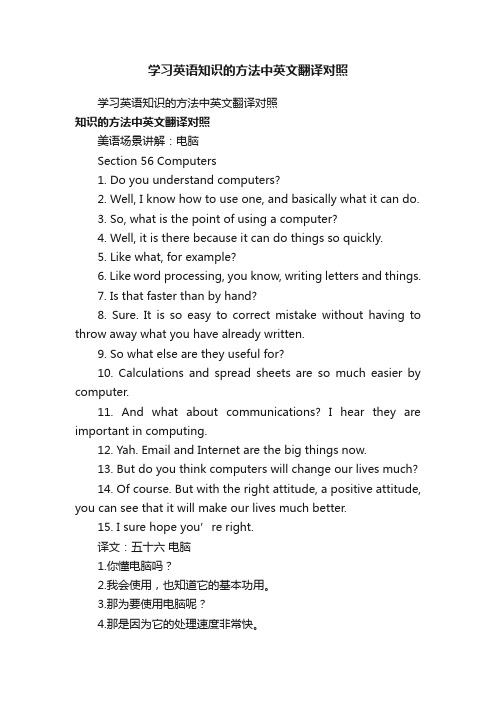
学习英语知识的方法中英文翻译对照学习英语知识的方法中英文翻译对照知识的方法中英文翻译对照美语场景讲解:电脑Section 56 Computers1. Do you understand computers?2. Well, I know how to use one, and basically what it can do.3. So, what is the point of using a computer?4. Well, it is there because it can do things so quickly.5. Like what, for example?6. Like word processing, you know, writing letters and things.7. Is that faster than by hand?8. Sure. It is so easy to correct mistake without having to throw away what you have already written.9. So what else are they useful for?10. Calculations and spread sheets are so much easier by computer.11. And what about communications? I hear they are important in computing.12. Yah. Email and Internet are the big things now.13. But do you think computers will change our lives much?14. Of course. But with the right attitude, a positive attitude, you can see that it will make our lives much better.15. I sure hope you’re right.译文:五十六电脑1.你懂电脑吗?2.我会使用,也知道它的基本功用。
新标准大学英语3课后翻译单元(中英对照)

新标准大学英语3 课后翻译〔中英对照〕:Unit1:英译汉:1 、We all sensed we were coming to the end of our stay here, that we would never get a chance like this again, and we became determined not to waste it. Most important of course were the final exams in April and May in the following year. No one wanted the humiliation of finishing last in class, so the peer group pressure to work hard was strong. Libraries which were once empty after five o’clock in the afternoon were standing room only until the early hours of the morning, and guys wore the bags under their eyes and their pale, sleepy faces with pride, like medals proving their diligence. (☞and guys wore the bags under their eyes and their pale, sleepy faces with pride …这句的动词wear 后面带两个宾语,中文找不到能带这两个宾语的动词,故处理成四个中文短句;翻译 like medals proving their diligence时,采用“增词法〞增加“这些〞来概括前面所描写的“眼袋〞,“脸色苍白〞,“睡眼惺忪〞等,使译文含义更加明晰流畅。
外研版八年级上册英语课文翻译(中英文对照更详细)
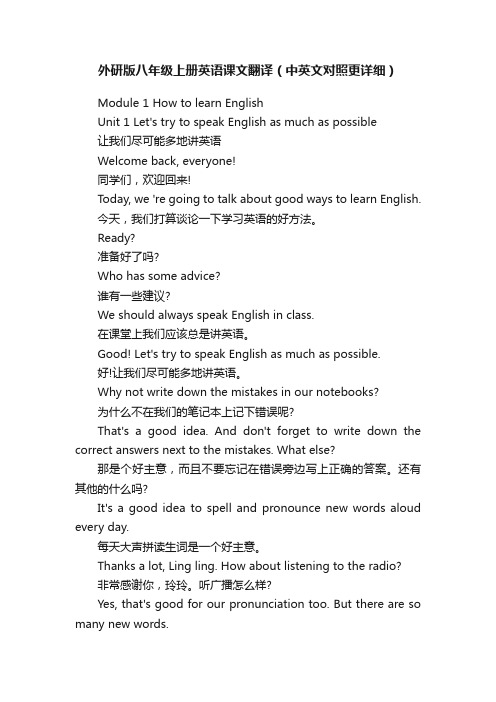
外研版八年级上册英语课文翻译(中英文对照更详细)Module 1 How to learn EnglishUnit 1 Let's try to speak English as much as possible让我们尽可能多地讲英语Welcome back, everyone!同学们,欢迎回来!Today, we 're going to talk about good ways to learn English.今天,我们打算谈论一下学习英语的好方法。
Ready?准备好了吗?Who has some advice?谁有一些建议?We should always speak English in class.在课堂上我们应该总是讲英语。
Good! Let's try to speak English as much as possible.好!让我们尽可能多地讲英语。
Why not write down the mistakes in our notebooks?为什么不在我们的笔记本上记下错误呢?That's a good idea. And don't forget to write down the correct answers next to the mistakes. What else?那是个好主意,而且不要忘记在错误旁边写上正确的答案。
还有其他的什么吗?It's a good idea to spell and pronounce new words aloud every day.每天大声拼读生词是一个好主意。
Thanks a lot, Ling ling. How about listening to the radio?非常感谢你,玲玲。
听广播怎么样?Yes, that's good for our pronunciation too. But there are so many new words.是的,那也有益于我们的发音。
英汉对照全译大全
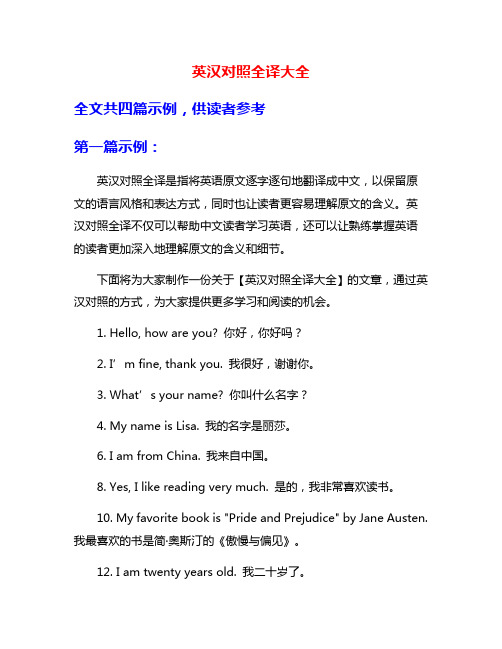
英汉对照全译大全全文共四篇示例,供读者参考第一篇示例:英汉对照全译是指将英语原文逐字逐句地翻译成中文,以保留原文的语言风格和表达方式,同时也让读者更容易理解原文的含义。
英汉对照全译不仅可以帮助中文读者学习英语,还可以让熟练掌握英语的读者更加深入地理解原文的含义和细节。
下面将为大家制作一份关于【英汉对照全译大全】的文章,通过英汉对照的方式,为大家提供更多学习和阅读的机会。
1. Hello, how are you? 你好,你好吗?2. I’m fine, thank you. 我很好,谢谢你。
3. What’s your name? 你叫什么名字?4. My name is Lisa. 我的名字是丽莎。
6. I am from China. 我来自中国。
8. Yes, I like reading very much. 是的,我非常喜欢读书。
10. My favorite book is "Pride and Prejudice" by Jane Austen. 我最喜欢的书是简·奥斯汀的《傲慢与偏见》。
12. I am twenty years old. 我二十岁了。
13. What do you do for a living? 你是做什么工作的?14. I am a teacher. 我是一名教师。
16. I enjoy listening to music and watching movies. 我喜欢听音乐和看电影。
17. Have you ever traveled abroad? 你有没有去过国外旅行?21. Do you have any siblings? 你有兄弟姐妹吗?22. Yes, I have one brother and one sister. 是的,我有一个哥哥和一个妹妹。
23. Are you married? 你结婚了吗?26. I plan to further my education and travel around the world. 我计划继续教育并环游世界。
- 1、下载文档前请自行甄别文档内容的完整性,平台不提供额外的编辑、内容补充、找答案等附加服务。
- 2、"仅部分预览"的文档,不可在线预览部分如存在完整性等问题,可反馈申请退款(可完整预览的文档不适用该条件!)。
- 3、如文档侵犯您的权益,请联系客服反馈,我们会尽快为您处理(人工客服工作时间:9:00-18:30)。
例1.Winners do not dedicate their lives to a concept of what they imagine they should be, rather, they are themselves and as such do not use their energyputting on a performance, maintaining pretence and manipulating(操纵)others . They are aware that there is a difference between being loved andacting loving, between being stupid and acting stupid, between beingknowledgeable and acting knowledgeable. Winners do not need to hidebehind a mask.1.dedicate to 把时间,精力用于2.pretence 虚伪,虚假6 .1 斤斤于字比句次,措辞生硬例2.Solitude is an excellent laboratory in which to observe the extent to which manners and habits are conditioned by others. My table manners areatrocious( 丑恶)—in this respect I've slipped back hundreds of years in fact, Ihave no manners whatsoever(完全,全然). If I feel like it, I eat with my fingers, or out of a can, or standing up —in other words, whichever is easiest.孤独是很好的实验室,正好适合观察一个人的举止和习惯在多大程度上受人制约。
如今我吃东西的举止十分粗野;这方面一放松就倒退了几百年,实在是一点礼貌也没有。
我高兴就用手抓来吃,(eat out of a can)开个罐头端着吃,站着吃;反正怎么省事就怎么吃。
3.Whatsoever 完全,全然1.Be conditioned by 受……制约2.Atrocious 丑恶6 .2 结构松散,表达过于口语化例3.有一次,在拥挤的车厢门口,我听见一位男乘客客客气气地问他前面的一位女乘客:“您下车吗?”女乘客没理他。
“您下车吗?”他又问了一遍。
女乘客还是没理他。
他耐不住了,放大声问:“下车吗?”,那女乘客依然没反应。
“你是聋子,还是哑巴?”他急了,捅了一下那女乘客,也引起了车厢里的人都往这里看。
女乘客这时也急了,瞪起一双眼睛,回手给了男乘客一拳。
(庄绎传,英汉翻译教程,1999 :练习 3 )译文1:Once at the crowded door of the bus, I heard a man passenger asked politely a woman passenger before him: “Are you getting off?” The woman made noanswer. “Are you getting off?” the man asked again, but the woman sill didn't pay attention to him. The man couldn't be polite any longer and asked loudly, the woman still had no response. “Are you a deaf or a dumb?” He became upset and gave a push to the woman, and also it attracted the attention of other passengers. At this time, the woman also became upset, stared at the man and gave him back a fist .译文2:Once at the crowded doorway in a bus, I heard a man asked politely a woman before him: “Are you getting off?” The woman had no response. He then repeated it but in vain.He got impatient and asked louder: “Getting off?”but still no answer at all. He became irritated(烦恼), shouting: “Are you a deaf or a dumb?” and gave her a push, which drew other passengers' attention. Annoyed, the woman glared at him and hit him back (with her fist).例4.Books possess an essence of immortality. They are by far the most lasting products of human effort. Temples and statues decay, but books survive. Time is of no account with great thoughts, which are fresh today as when they first passed through their author's minds, ages ago. What was then(那时候) said and thought still speaks to us vividly as ever// from the printed page. The only effect of time has been sift out( 筛落) the bad products, for nothing in literature can long survive but what is really good.译文1:书的特质在于永恒,是人类经努力奋斗而产生的最长久产品。
庙宇和雕塑会腐朽,但书籍却能永存。
时间在伟大思想面前毫无作用,许多年前闪现在作者心头的思想至今仍栩栩如生。
当年的所言所思至今仍在印刷的纸上生动地回响。
时间的唯一作用就是去掉糟粕。
只要是真正的精华就能在文学上永存。
译文2:书的实质在于世代永存,是迄今人类长期努力得来的最持久产品。
庙宇会坍塌,雕像会腐蚀,但书籍却能永存。
伟大的思想不会因岁月的流失而消泯,前人的思想历久长新,其所言所思至今仍跃然纸上、声声入耳。
悠悠岁月只会去尽糟粕,真正的好书经得起历史的淘汰和荡涤(反选)。
6 .3 语篇整体与局部例5.(前 6.2.1 例 2 )大家都说,糟了,怕是遭了狼了!(1) When seeing this, everybody there realized that something bad must have happened ----- he was killed by a wolf! √(2) Everybody said that it was too bad! He was likely to meet with a wolf!例6. “…”, began Clyde, who did not quite like the l ooks of the man before him, but was determined to present himself as agreeable as possible .(1) “ ……”,克莱德开口说。
尽管他不太喜欢眼前这个人,但还是决定让自己表现得尽量随和一些。
(2) ……。
尽管他不太喜欢眼前这个领班,但还是决定让自己尽量迎合一下对方。
例7 . 孔子很早就说:“ 四十而不惑”。
意思是到了四十,就是肥肉一块吊到你嘴边,你饥肠辘辘馋涎欲滴,也不应该伸脖子去贪嘴了。
Dangle v. 摇晃地悬挂着juicy meat6 .4 形式与内容的统一例8.On one of those sober (严肃)and rather melancholy(忧郁)days, in the later part of Autumn, when the shadows of morning and evening almost mingle together, and throw a gloom over the decline of the year, I passed several hours in rambling (漫步)about Westminster Abbey. There was something congenial (适意的)to the season in the mournful (悲哀)magnificence of the old pile; and, as I passed its threshold, seemed like stepping back into the regions of antiquity, and losing myself among the shades of former ages. (Washington Irving, Westminster Abbey )时方晚秋,气象肃穆,略带忧郁,早晨的阴影和黄昏的阴影,几乎连在一起,不可分别,岁将云暮(岁聿云暮suì yù yún mù指一年将尽。
同“岁聿其莫”),终日昏暗,我就在这么一天,到西敏大寺去散步了几个钟头。
古寺巍巍,森森然似有鬼气,和阴沉沉的季候正好调和;我跨进大门,觉得自己已经置身远古,相忘于古人的鬼影之中了。
——“ 西敏大寺”,夏济安译,1976,p. 541.Sober adj. 严肃的2.Melancholy adj. 忧郁的3.Congenial adj. 适意的4.Mournful adj. 悲哀的5.Threshold n. 门槛6.Antiquity n. 古物例9. 拿有些古都来说,其建筑体现着三个层面:由宫殿府邸、皇家园林等构成的帝王古都;由道观神庙、社稷祭坛等构成的“鬼神”古都;由胡同、四合院及其它民居建筑构成的老百姓古都。
